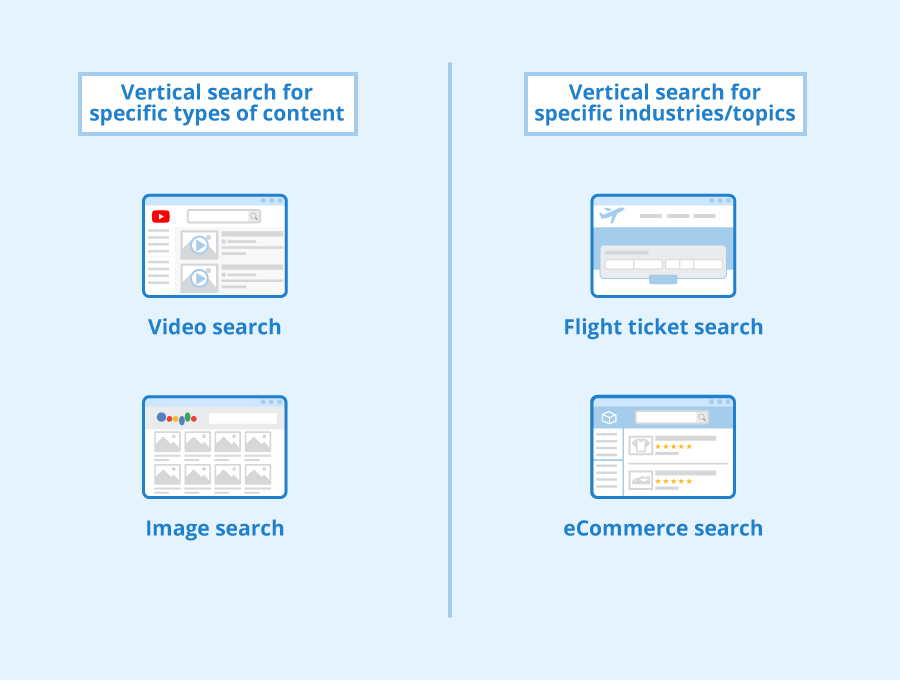The Rise of Vertical Search Engines their Significance, Impact on the way we Search for Information Online.

The Rise of Vertical Search Engines their Significance, Impact on the way we Search for Information Online.
Introduction:
In the ever-expanding landscape of the internet, search engines have played a pivotal role in helping users discover and access information. Traditional search engines like Google, Bing, and Yahoo have dominated the field for years. However, the digital world is undergoing a transformation with the emergence of vertical search engines.
In this blog post, we’ll explore the rise of vertical search engines, their significance, and their impact on the way we search for information online.
Understanding Vertical Search Engines:
Vertical search engines, often referred to as niche or specialized search engines, are tailored to cater to specific industries, topics, or types of content. Unlike traditional search engines that provide a broad range of results, vertical search engines focus exclusively on one subject or category. For example, Kayak is a vertical search engine that specializes in travel, helping users find flights, hotels, and rental cars, while Zillow is known for its vertical search in real estate.
The Significance of Vertical Search Engines:
Vertical search engines have gained prominence for several reasons:
Relevance: One of the primary advantages of vertical search engines is their ability to deliver highly relevant results. Since they concentrate on a specific niche, the results are more tailored to users’ needs and interests.
Precision: Vertical search engines allow users to find specific information more quickly. For example, a person looking for a rare book would be better served by a vertical search engine for rare books rather than a general search engine.
User Experience: The user experience on vertical search engines is often superior because of their specialized focus. Users can access a streamlined interface with features and filters that cater to their specific needs.
Market-specific Information: Vertical search engines often provide market-specific data and pricing, making them invaluable for users in industries such as e-commerce, real estate, and healthcare.
Competitive Advantage: For businesses and organizations operating within specific industries, vertical search engines offer an opportunity to compete and establish a strong online presence. Users looking for niche products or services are more likely to discover specialized businesses through these platforms.
Examples of Vertical Search Engines:
Zillow: Zillow is a vertical search engine dedicated to real estate. It provides users with property listings, market data, and tools for buying, selling, and renting homes.
Yelp: Yelp focuses on the restaurant and local business industry. Users can search for restaurants, read reviews, and find other local services.
Healthgrades: Healthgrades is a vertical search engine that specializes in healthcare. Users can find and research doctors, hospitals, and medical facilities.
IMDb: IMDb is dedicated to the film and television industry, providing users with information about movies, TV shows, actors, and crew members.
Booking.com: Booking.com is a vertical search engine for travelers, offering a wide range of accommodations and travel-related services.
Challenges and Opportunities:
While vertical search engines offer several advantages, they also face challenges:
Limited Coverage: The specialized nature of vertical search engines means they may have limited content compared to general search engines.
User Awareness: Many users are more familiar with traditional search engines, and it can be challenging for vertical search engines to gain recognition and trust.
Content Freshness: Keeping niche content up-to-date can be a challenge, particularly in rapidly changing industries.
Monetization: Generating revenue through vertical search engines can be more challenging due to their narrower focus.
Conclusion:
The rise of vertical search engines marks a significant shift in the way users search for information online. These specialized platforms offer a higher level of relevance, precision, and user experience in specific industries. As vertical search engines continue to evolve and grow, they provide both businesses and users with unique opportunities to access and deliver content tailored to their specific needs and interests. In an age of specialization, vertical search engines are becoming increasingly important players in the digital landscape.
For More Related Articles Browse Our Website Blogster.pk
For social Connection You can also Visit and follow our Social media Platforms
Facebook , Instagram, Linkedin, Pinterest, Quora, Twitter, Youtube.





